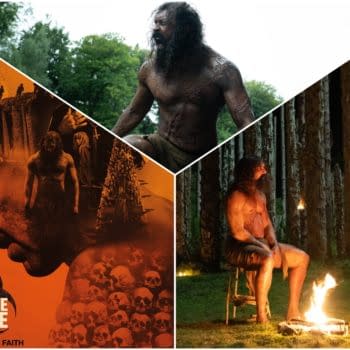Posted in: Movies, Recent Updates | Tagged: entertainment, film, indy filmmaking, production, Robin Hood Films, roger corman
Film Schooling: Insider Insights On Indy Filmmaking – Pre-production And Tools Of The Trade
By Chris Hood
(This is Part Thirteen of an ongoing series to help educate aspiring filmmakers on the process of making their first film. Previous articles in this seriescan be found at BleedingCool.com and MovieIndustry.com in Parts: 1, 2, 3, 4, 5, 6, 7, 8, 9, 10, 11, 12)
First, let me thank you for bearing with me this long. I know that you, my little muskrats, are eager to get to production, but laying the proper groundwork before shooting is paramount (Get it? Paramount? I'm brilliant!). We'll get into actual production tips next week, but I do want to advise on one more key area prone to problems: getting the equipment and supplies you'll need to be truly ready on Day One.
Now, if you had the list of equipment needs laid out in front of you at the start of your project, you'd likely be daunted. In truth, if you knew all the headaches and heartbreaks you were in for when it comes to filmmaking, you'd likely never engage in the prospect to begin with. But no matter how much we curse and complain and cry and yell and insist we'll never go through it again and that there's no way it could ever be worth it, somehow it always is. The screw turns and we can't wait to do it again. (I think the word is "masochism")
There are hundreds of "things" you'll need to make your film. Some of these are obvious enough, but you'll find there are many, many items essential to the task that you simply don't think about or know of until you're there in the trenches. Experience will prove a saving grace in this respect, much like in every other area of the project. And this is another aspect where department heads will step up and make sure the package is complete before Christmas morning when the cameras are set to roll for the first time. Trust the people under you. Delegate. Great men surround themselves with people who know more than they do. Every department head should be more knowledgeable about his field than you and your job is going to be easier because of it. You're not just hiring these people to be there on set for three or four or five weeks; you're hiring them to make sure everything they could need to do their part of the job is also there with them.
Let us assume you're "just" a producer on the film. The camera and related package will be selected by the director and cinematographer (possibly just the latter if your director is a newbie). They'll tell you what they need for the show. In most cases, they'll tell you where to get it. It's not just about getting a camera, it's about getting the best camera possible to best fit the vision of the director. The only place you really step in here is if they tell you they want to shoot in VistaVision and the budget can barely afford Colecovision.
This is true of every department – let them tell you what they need. That's one of their mandates. But keep in mind, every department thinks they're the most important to the film and will often ask for things which aren't essential. It's up to you to differentiate between the "needs" and the "wants". It seems everyone wants more than is absolutely necessary. The camera department wants more lenses, more days with the steadicam and a bigger crane. The lighting department wants a bigger truck with more options and more gels and filters. The art department wants more money for set decoration and bigger and better props. Craft service wants more money for snacks (who doesn't?). Diplomacy will play a big part here, as well as some common sense in determining what you can and cannot do without. Unfortunately, as an indy producer, what you'll be saying most often to people is "no." Try coming up with new and interesting ways to do it. I have. (One of my favorites is – "Yes, but exactly the opposite.")
Now, I said that your department heads will usually be able to point you in the right direction on where to find their respective tools. One thing to be aware of is that it's not uncommon in the business for a department head to get a kick back from a rental or sales facility they direct business to. Just make sure you're getting a reasonable deal on your camera and not going that route because they're the company giving the biggest stack of cash to the cinematographer or gaffer or prop master.
In some cases, you're told what is needed and it's your job to make it happen. In others, a budget is allotted and you may simply hand over a check or petty cash (get receipts for everything). You won't be giving a check to your gaffer to get the lighting equipment because that's a complicated process with insurance and contracts. You will be giving your craft service person some money every day to go buy soda and water and Goldfish crackers (unless you're a terrible producer who has no business being in this industry because you don't understand the importance of these delectable snacks for the smooth running operation of a film set. Can you say "essential," bitch!). You'll often give your art director money to assemble the things he needs for that department. It's simply a case of practicality. You're not going to go to the thrift shop with your prop master to write a $30 check for some set pieces. It might take him 5 or 10 or 50 stops to get all the things he needs. There's no need to micromanage. You can't. There's simply no time for it. Of course, $10k or $20k for a truck and lightning package should demand some oversight.
Renting equipment and supplies for a production, once you know what you want, can prove more time consuming than you'd expect. You'll have to deal with rental contracts, deposits and insurance. There will be so many things that crop up in the weeks and days prior to the commencement of filming, it's imperative you are as prepared as possible. If you wait too long to tackle some of these elements, they simply won't get done in time. In almost every case I know of with first time filmmakers, the original start date is pushed for this very reason. Sometimes this isn't a big deal. Sometimes it is. The bigger the project, the more likely this could create problems.
If it's not already obvious enough, this is why you want your department heads locked down as early as possible. If they're coming to you directly from another show, they can eek out some time to assemble a list of what you can be working on for them prior to their being cut free from the previous gig. Be a well oil-machine. Of course, in lieu of that, sometimes it's okay to settle for just being well-oiled, but I digress….
One other area we've touched on at various points in these other articles is the items you'll need for you own production department. Most notable is the paperwork of which there is plenty. Cast contracts, nudity releases, crew deal memos, writer contract, insurance policy, production schedule, day out of days, budget, call sheets, SAG paperwork, contact lists, etc. As with other areas, I'm very much hoping that if this is your first film that you'll have someone experienced in your own department as well, be it the Unit Production Manager and/or Production Coordinator. There is no substitute for experience. I learned more about filmmaking my first three weeks on a Roger Corman film set than I did in four years of college.
A wiser man than me once said…actually, never mind…I don't know any smarter men than me…(Yeah, I know, it's "I". Shut up!) So on that note, I'm off to polish my wisdom so I can whip it out again next week for you!
Chris Hood is a writer, producer and director of such films as "Counterpunch" starring Danny Trejo and "Dirty Dealing 3D" with Michael Madsen and C. Thomas Howell. He is also owner of Robin Hood Films, a Las Vegas-based distribution company representing English language films around the world and operates a film blog at MovieIndustry.com. He's also dead sexy. (Mr. Hood denies any involvement in the creation of this mini-bio.)

















